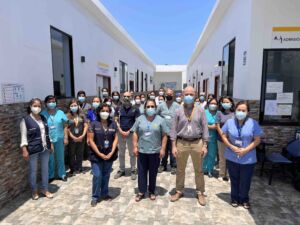When the World Health Organization labeled COVID-19 a pandemic in March 2020, researchers within the mental health community quickly began sound the alarm about a concurring silent pandemic: mental health illness. In Boston, Greg Fricchione, MD, and Guiseppe “Bepi” Raviola, MD, leaders of the MGH Chester M. Pierce Division of Global Psychiatry, have actively worked to position the division in response to the ensuing mental health crisis.
Even before the first case of COVID-19 was reported, the global burden of mental health illness was rising. In 2019, the World Health Organization (WHO) reported that in 2017 approximately 379 million people suffered from a range of mental disorders including depression, bipolar disorder, schizophrenia, and dementia, a 13% rise from 2007. They also found between 76% and 85% of people with mental disorders living in low- and middle-income countries received no treatment. The COVID-19 pandemic made matters worse. The WHO reported a 25% increase in the worldwide prevalence of anxiety and depression, due to stress, social isolation, and disruption of mental health services.
The Chester M. Pierce Division of Global Psychiatry, founded in 2002 by Fricchione and the late Chester Pierce, MD, works to increase access to mental health services by expanding global psychiatric training and care through bi-directional partnerships. When the two initially became involved in this work, the WHO and other large health organizations did not consider mental health a priority relative to diseases such as tuberculosis, malaria, or HIV/AIDS. However, the advent of the disability-adjusted life years measure changed these priorities in the 1990s.
“The global burden of disease studies came along, and they had a measure called the disability-adjusted life years,” Fricchione says. “That measure revolutionized how the World Health Organization and Center for Disease Control ranked diseases because—in addition to disease mortality—morbidity and impact on one’s quality of life entered the metric.”
The division’s early work capitalized on this changing science, pushing for greater urgency in increasing mental health programs worldwide. Over the past two decades, the division has helped launch programs in Brazil, Nepal, Albania, and South Africa. However, the pandemic highlighted another range of issues affecting mental health.
“COVID-19 has clarified a lot of the issues we had prior to the pandemic,” Raviola says. “Including the extent of health inequity, the extent of the impacts of political violence, and the oncoming threat of climate change.”
Raviola described the wide network of converging crises as a syndemic, or overlapping pandemics of biological and social ills, to the Harvard School of Public Health. This term identifies the deeply traumatic effects of the pandemic by combining its biological effects—illness, disability, and death—with preexisting political and social contexts—such as racism, sexism, and underfunded health services. Alexander Tsai, MD, PhD, associate director for Research and Trainee Development in the division and the director of the MGH Center for Global Health and Mongan Institute Program on Social Policy and Behavioral Health, has also been a key contributor to syndemics theory and how social policy can be used to address social determinants and shift the distribution of mental health outcomes. The combined expertise within the division shapes the next era of their COVID-19 response work.
Raviola cites a refined focus on service delivery and health systems strengthening as key features to guide the division in its response to COVID-19. As Fricchione steps away as the division’s director and Raviola assumes the role, he plans to continue addressing syndemics by advancing partnerships with organizations like Partners In Health, building training and education programs, establishing new collaborations to build digital mental health programs, and working directly in the mental health response to COVID-19.
“The division will think about explicit ways to engage on the broader issues that COVID-19 has raised: the effects of structural racism, political extremism, climate change, and all of the other disruptions.” Raviola says. “We will apply lessons from how global mental health can be brought to bear on these issues.”



